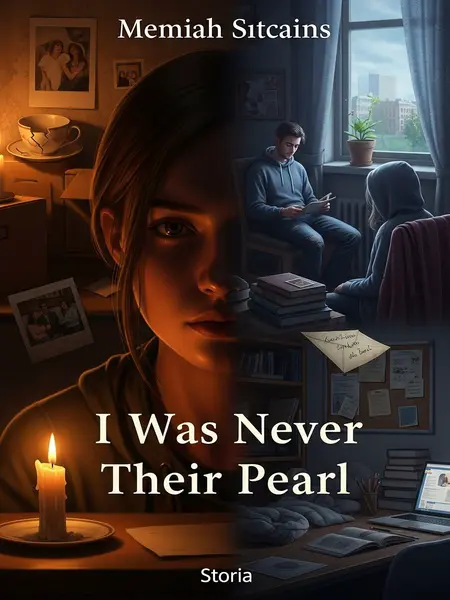Chapter 3: Goodbye, Jamie
I packed my bags and boarded a bus to Houston, heart pounding with every mile. The city lights felt like a promise, even if I didn’t know what they promised yet.
I went to Houston. During that time, my stepmom was very nice to me, always calling to check in:
“Mariah, how have you been? Is factory work tiring?”
“Mariah, is the pay good? Your dad’s garage isn’t doing well, can barely cover your brother’s expenses.”
“Mariah, when are you coming home? I’ll cook for you.”
It was all an act. Eventually, I stopped answering her calls, because I knew she just wanted my wages. If I’d dropped out earlier to work, maybe I could have enjoyed her ‘motherly love’ sooner.
Her sudden sweetness made my skin crawl. I wasn’t falling for it. I knew better than to trust it. I kept my head down, clocked in and out, and saved every penny I could.
Not long after, the exam results came out. I deliberately avoided the release date, but Yvette, who worked the same assembly line, kept checking for me. One noon, she dragged me to an internet café despite my protests. “You studied so hard for so many years—what’s this now? Do you really want to rot on the assembly line like me forever?”
Yvette was loud and stubborn, with a heart as big as Texas. She wouldn’t take no for an answer, dragging me by the arm down the street.
I thought I’d already accepted my fate, but I still cried, begging her not to force me. Yvette thought I was just being dramatic. “You’re the only one I know who took the SAT—pass or fail, you need to know, one way or the other.”
She handed me a tissue, rolling her eyes. “You’re tougher than you think, Mariah. Now go check.”
I logged in to check my score. My admission ticket number was long, but I’d memorized it by heart. The wait for the page to load felt longer than my whole life.
My hands shook as I typed, the old computer whirring and sputtering. Every second felt like a lifetime.
When the page finally loaded, I turned away. Yvette’s scream pulled me back: “1450! Mariah, I never went to high school, but is that enough to get in?”
She hugged me so tight I could barely breathe, her laughter echoing through the cramped internet café. I started sobbing, the kind of crying that leaves you breathless and empty. I couldn’t stop.
I felt the world spin. 1450. The lowest admission score for our state’s top university that year was 1400 for liberal arts. I hugged Yvette and sobbed, wanting to cry out everything I’d been through. My hardship, my embarrassment, my bitterness—I wanted to let it all out. Yvette didn’t know why I was crying, she just awkwardly patted my back again and again.
We sat together on the curb outside, letting the sun warm our faces, not caring who saw us. For the first time, I let myself hope.
That afternoon, we didn’t go back to work. We wandered the city’s shopping street, didn’t buy anything, but strolled all afternoon. My homeroom teacher called, ecstatic—who would have thought a rural high school could produce a top university student? I also called my brother. He was silent for a long, long time—so long I thought I’d dialed the wrong number. Finally, he laughed and said, thank goodness his mother didn’t ruin my future. My brother is just that kind of person—he always felt like he had to make up for what she did.
We made plans to celebrate, just the two of us, when I got to college. For a moment, the world felt wide open.
Because I had to fill out my college application, I asked my supervisor for three days off to go back—two days for travel, one for the application. Yvette was more excited than me, told everyone on the assembly line about my score, and everyone came to congratulate me. The supervisor was a good person—he applied for an outstanding worker award for me, a two-hundred-dollar bonus. He said he got into college too, but his family couldn’t afford to send him. He said I had a bright future, and I deserved the bonus.
He handed me the envelope with a smile, clapping me on the back. “Make us proud, Mariah. You’re going places.”
When I got home, they were eating. My stepmom was surprised to see me, then started questioning: “Why are you back? Got fired from the factory?” I didn’t tell them I’d gotten into college—no one would congratulate me anyway. I just said, “Missed home, came back to visit.”
I sat at the end of the table, picking at cold leftovers, wishing I was anywhere else.
Dad only cared about the food. “Why bother coming and going? Wastes travel money. Don’t come back unless you have to.”
His words stung, but I just nodded, staring at my plate. I’d learned not to expect more. I was used to it.
My brother called, telling me over and over to apply to a university in Chicago so he could take care of me. But I didn’t listen. In the end, I went to St. Louis. At that time, I had my own ideas—I didn’t want to burden my brother, and St. Louis had a lower cost of living than Chicago. My brother was furious when he found out, didn’t think he’d actually curse at me—called me crazy. I told him I’d already returned to work and planned to keep working until school started, so I could cover most of my tuition and living expenses myself. I asked if I was being sensible.
He sent me angry texts for days, but deep down, I knew he was proud of me. I was finally making choices for myself.
That month working in Houston was the happiest time of my life. Yvette and I would buy a watermelon, sneak it into the factory break room fridge for an afternoon, then split it and eat it together. We bought a pot for the dorm and cooked dinner after work—her specialty was mac and cheese. Sometimes we’d buy ten bucks’ worth of meat and make pulled pork that lasted two or three days. On days off, we’d go shopping—not really buying anything, just enjoying ourselves despite being broke. I even thought sometimes that if I could stay at the factory with Yvette forever, it wouldn’t be so bad.
We’d laugh late into the night, swapping stories and dreams, our worries melting away over bowls of cheesy noodles. It was the closest thing to family I’d ever had.
More importantly, I met Sean. Sean looked like someone out of a movie—tall, handsome, fair-skinned. We met at the supermarket outside the factory—we both wanted the last umbrella. He asked to have it and said he’d walk me home first. I agreed. He asked where I lived, and out of vanity, I lied and said I lived in a nearby neighborhood.
He grinned, holding the umbrella high above us, his laughter bright as the summer rain. I felt my cheeks flush, a warmth I hadn’t known in years.
He was the grandson of the factory cafeteria manager, from Chicago, spending the summer with his granddad. That day, he walked me to the front of the apartment complex. I watched him leave, then ran back to the dorm alone in the rain.
My shoes squelched with every step, but I didn’t care. I hugged my arms around myself, replaying his smile in my mind.
Later, we often ran into each other at the supermarket. He asked for my phone number, sometimes invited me out. He was so cheerful, he made my heart race, and I couldn’t help but want to be near him. He took me to the internet café and taught me to play League of Legends. He took me out for late-night burgers, but wouldn’t let me drink. He bought me a childish bracelet with “SJ”—his initials—engraved on it. He even secretly drove his granddad’s car and took me for a midnight ride. He even took me to his grandparents’ house.
Every moment with him felt like a scene from a movie I never thought I’d star in. He made me feel seen, like I mattered.
I used to wonder what kind of people lived in mansions—turns out, it was people like Sean. Luckily, his granddad hadn’t seen me at the cafeteria. His grandparents were very warm. At dinner, his grandma put a whole lobster tail in my plate. Sean said his grandma never treated him that well—usually he had to beg for a long time to get lobster, but she cooked one as soon as I came. Grandma tapped his head with a spoon: “No manners! How can a boy be petty with a girl?” She also said she liked girls best, always wanted a granddaughter—girls are thoughtful and caring, unlike boys, who are stinky. I didn’t know what to say. In my family, boys never had to compete with girls—girls didn’t dare, and boys didn’t need to.













